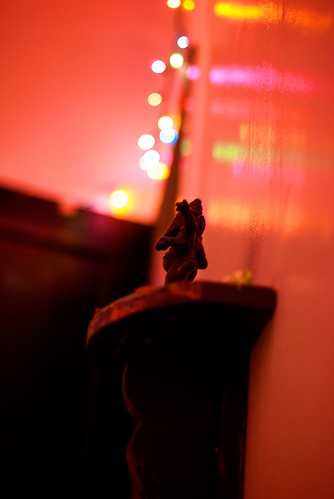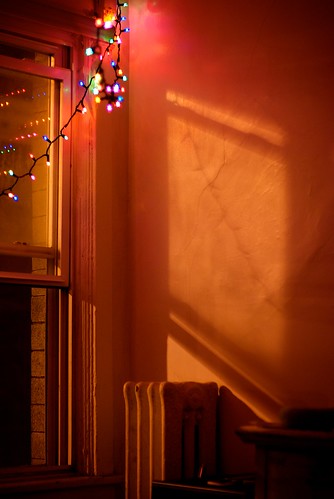I thought that if I tried harder… that I’d achieve enlightenment faster. What happened instead?
the heart & the law
/ / Arlington, Massachusetts
Part of the the Heart & the Law collection
When I started to sit zazen with a college group thirteen years ago, I took to it with a fervor. You may know my type – sitting past the point of pins and needles, past the point of electric pain, until I’d ‘conquered’ the pain; asking for kyosaku every chance I got, trying to sit far longer than my mind or body really wanted to allow. And no, I’m not the type who enjoys pain. So why?
I thought that if I tried harder, pushed past the discomfort, became the perfect student of Zen, that I’d achieve enlightenment faster. What happened instead?
Dokusan
My first and only dokusan that decade lasted about 45 seconds; barely enough for me to struggle myself into place (my legs still screaming from zazen). The Master slapped the floor once and smiled. I looked at him blankly. He slapped the floor again, smiled. I hesitated, slapped the floor and looked to him for approval. No smile.
He slapped the floor again, smiled. I slapped the floor. No smile.
Again. He slapped the floor with a chuckle. I swung my arm to slap the floor again… and I stopped just short of my hand touching the floor.
He clasped his hands once, then rang the bell.
I left. And did not return to sitting with others for nearly a decade.
For the next several years I alternated between periods of intense sitting and reading every Buddhist book I could get my hands on; so much so that most Buddhist writing became a monotony of the Eightfold Path, the Three Poisons, the Buddha’s life. So much so that one day, I gave up the practice altogether – or so I thought.
The Law
Buddhism, like just about every paradigm, has its own set of rules and regulations: speak truth, don’t sell drugs, abstain from sexual misconduct. All of that comes free from almost every spiritual tradition I know of. And yet here’s this guide whispering to us the secrets of emptiness, admonishing us to seek out our own salvation and take to our hearts only what we know to be true, warning us to leave the raft by the river once we’ve crossed.
Discipline in spiritual practice isn’t simply a good thing; it’s essential. At what point, however, does self-discipline turn into self-abuse? I found myself one evening in 2000 with a few other Buddhist types drinking strong coffee and arguing over interpretation differences between Theravadan, Mahayana and Vajrayana schools of Buddhism. The conversation started off simply enough, but devolved with astonishing speed into a contest of whose interpretation was more correct. So much energy fed into our dialogue that the Starbucks manager warned us to quiet down! (Despite the fact that heated philosophical arguments weren’t uncommon just about anywhere in Harvard Square.) I sat there for a moment as we were shocked into silence, when a wave of deja vu came over me. I’d seen this conversation before, in so many different contexts. In my Philosophy classes in college. In a debate between a Catholic student, a Jewish student, and a Muslim student. At every table in the college cafeteria… We get so wrapped up in defending our path, defending the choices we make – against what? – and we do it over and over again.
I got to thinking – this was about the time I really started to delve into Tibetan Buddhism and struggled with the concepts of reincarnation and karma, and the meaning of emptiness – how that energy we invest in upholding ‘The Law’ of our practice doesn’t go outward only. We turn it against ourselves, as I did, to be more, to do more, to push ourselves past challenge and into punishment. Who among us never thinks or utters in our private breaths that we could have or should have done more?
It still took another 3 years, a 3-month saga of homelessness 3,000 miles from any place I really understood, and 3 days in a psych ward before the lesson set in: The Law is only half of the path. Its guidance alone, while invaluable and indispensable, will no more lead us to enlightenment or satori or the path of the Bodhisattva than to outright flout our vows.
The truth of emptiness, in my personal experience, is that the path is beneath us no matter which way we tread, and that there is only one way to know whether we are moving ahead, standing still, or slipping back.
The Heart
When I mention the concept of acceptance to most people – of accepting their now, accepting their faults, accepting life the way it is – they bristle. I watch their necks tighten, their shoulders pull up and forward. People valiantly defend why their now is unworthy, why they aren’t good enough, why their life and world should be anything other than the way it is.
Yet when we’re done, we have no energy to effect change. We’ve spent it all on the not-now, the not-here. I’ve heard the arguments – “but people are being slaughtered”; “but we must not rest until all are enlightened”; “but if I accept myself I’ll stop moving forward in my life.”
Acceptance was the only thing that got me moving again. Acceptance isn’t about loving terrible things people do to each other or saying we’re thrilled with who we are right now. Acceptance about releasing blocks that keep us from seeing clearly.
How does that work in a Buddhist context? So many of us want to become enlightened quickly so that we can help others achieve the same freedom. We struggle tirelessly toward that end, barely noticing when we scold ourselves for not being true to the Dharma here, or for failing to sit on a certain date, or when we berate ourselves for letting an angry word slip.
The hardest part of the Eightfold Path is not keeping the law in interactions with others; it’s applying the practice with compassion to ourselves. We want to change the world. We want to do more than we’re doing. The most difficult wisdom is in knowing when we’re doing the best we can do at any particular moment.
I woke up on the second day of my stay in Maui’s Molokini Ward (a psych hospital) to a realization that released me from a path of self-denial I’d been unwittingly following for too long: I did what I thought was right at every moment in my life, and I could never have done otherwise. And with that thought, I released myself from all the mistakes and errors for which I hated myself.
I have racked my brain, searched for counter-examples, questioned many, but none have been able to tell me otherwise: Not one single person among us commits the act we know is wrong, because even when we choose an action that later days prove unwise, we justify it and make it right.
Knowing I’ve made mistakes, knowing I’ve hurt people, said hurtful things, and yet knowing I always chose the best option I had the wisdom and understanding to choose – has freed me from bondage to things I can’t change.
And that brought me to a new level of compassion, compassion for myself and for those around me. We’re all making mistakes for the same reasons: fear, ignorance, attachment, aversion. We’re all subject to a human form and the rules of our immediate existence; what arrogance leads us to believe that we should deny the form and function of who we are, instead of following a path that unites the wisdom of enlightenment with the compassion of acceptance?
When you sit, just sit. Don’t applaud yourself for sitting. When you miss a sitting, resolve to return to practice as soon as possible. Do it without reproach.
Resistance and attachment only empower the things with which we struggle; acceptance coupled with resolution to act according to our new wisdom simply carries us around these struggles.
That’s it. Let the heart of your practice guide your response to yourselves and others. Accept what you have done and who you are, without limitation. Let the law of your practice guide your actions. As new wisdom enters your life, act according to it.
And where and when the two appear to clash, therein lies the space for deeper practice, for breath, for awareness — for awakening.


